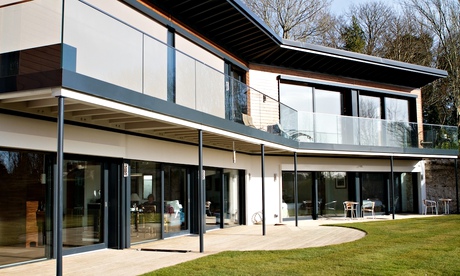
We arrived at Skyhouse on a wintry evening, with lashing rain and mist obscuring any view. When we woke up it was spring, and the name of this brand-new B&B made sense – the view from the sliding glass doors of our room was two-thirds blue sky, one-third rooftops and green hills.
Skyhouse sits on the top of Cuilfail Hill, overlooking Lewes, a town known for its support of green causes (as a Transition Town, it is dedicated to finding more sustainable ways of living). But Skyhouse is a first in the area: a high-spec, pre-fabricated eco-home shipped from Germany in parts and assembled in just four days. That was the easy part. It had taken months to prepare the land, knocking down a dilapidated 1930s house and cutting into the chalky hillside, which forms a natural, ragged wall around the rear of the property and is visible from one of the bedrooms.
“I like it as a reminder of where we are and the feeling that we are close to nature,” said American owner Amy Burgess, who sold her 45-acre ranch in rural Colorado to start anew in Lewes.
Burgess used to run an international mentoring company, and within about five seconds of meeting her I can see how the determination that made her a successful businesswoman has helped her realise her dream eco-home. Not content with standard materials, she spent months tracking down non-toxic sealants and adhesives, so the interior of the house would be as “healthy” as the exterior.
A natural optimist, she is convinced that as a society we are on the brink of embracing a more environment-friendly way of living, despite the lack of will from the main political parties. In the meantime, she has already made her patch of land carbon-neutral. There are solar panels on the lawn, a pellet boiler for underfloor heating, and walls insulated with sawdust. But these are mostly hidden features. We live in a drafty, wonky small Victorian terrace, and what we noticed most was how slickly everything works: doors shut softly; the shutters open and close with little noise at the touch of a palm-size remote control. Everything felt smooth, sometimes literally. I couldn’t help stroking the curved wall of polished lime plaster that leads to the two guest rooms.
If this all sounds a bit hair-shirt, it’s not. There’s a sense of peace and well-being, aided in part by the no-kids policy, but also by the treats on offer, including in-room massages. Mine left me so relaxed I had to be coaxed into going out for dinner instead of lounging on the sofa. It was worth it though – the Ram at Firle, a 10-minute drive away, had low-ceilinged rooms, open fires, oil-wick candles, good food and genuinely friendly service.
While Skyhouse is German-made, the interior has a touch of the Orient, with Chinese art and furniture in the living room. Come summer, the wood, glass and steel exterior will be softened by plants and flowers and breakfast will be served on the terrace, weather permitting. Not that Skyhouse is lacking greenery. Nature is on the doorstep here. The back gate opens on to the downs. Glyndebourne, home of the opera festival, is a gentle two-mile walk across country.
Waking up to blue sky, we felt a walk was in order, but needed breakfast first. The healthy ethos extends to the food, a choice of “smoothie bowls” pre-ordered on booking. My “red” bowl of yoghurt and fruit purée – topped with rows of strawberries, blueberries, bee pollen, chia seeds, pomegranate and cocoa-covered goji berries – was the prettiest bowl of food I’ve ever eaten and probably held more goodness than I usually have in an entire day. My partner opted for the goodness of a cooked breakfast. Two giant loaves of sourdough were on standby in case we were still hungry.
Then it was out on to the downs where we immediately stumbled across the town’s obelisk, a stone monument to the 17 protestant martyrs burned at the stake in the mid-16th century – they are commemorated today in the town’s famous Guy Fawkes night celebrations, when tar barrels, flaming crosses and a giant bonfire draw crowds of up to 80,000.
There were no signs of fire on our Sunday stroll down Cliffe High Street later that morning, just the whiff of middle-class hippiedom in the stylish gift shops, antique emporiums and smart delis (there’s a branch of Bill’s here). Standing proud on the bank of the river Ouse is Harveys brewery and shop. Given Lewes’s thriving indie shops and restaurants, countryside and coast on the doorstep, it’s small wonder Londoners are moving here in droves. We didn’t want to leave.
• Accommodation was provided by Skyhouse (Cuilfail, Lewes, 07468 691860, skyhousesussex.com) doubles from £150 B&B, minimum two-night stay at weekends, no under-12s, 10% discount if you arrive by public transport
Ask a local: Mark Greco, artist and illustrator (anaturalhistory.co.uk)
• Shop
On Cliffe High Street, Leadbetter and Good sells beautifully designed objects for home and garden. I regularly visit Paul Clark’s menswear shop, and my wife tells me his ladies’ shop is excellent, too.
• Explore
Wonderful flint-walled alleyways (known as twittens in Sussex) weave between hidden houses and secret gardens in Lewes. And look out for the Round House, once owned by Virginia Woolf, in Pipe Passage.
• Drink
Don’t leave town without sampling a Harveys ale in a friendly hostelry. The Lewes Arms is a favourite, as is the Swan in Southover.
• Eat
Great cafes include the one in the Needlemakers (a former factory), the Buttercup Cafe and the Flint Owl Bakery. Chaula’s serves a great Indian buffet lunch.
• Walk
The Sussex Wildlife Trust has some wonderful reserves around Lewes. Walk to Malling Down, which has amazing chalkland butterflies in late spring.

